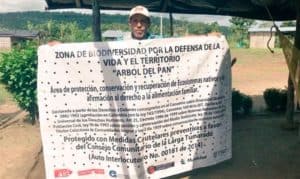See below for text in Spanish/ Para leer el siguiente texto en Español, véase abajo.
On 26 November 2017, community leader and land claimant Mario Castaño Bravo was killed. As a result, international civil society organisations released a public statement warning of the serious humanitarian and human rights situation that indigenous, afro-descendant and peasant communities continue to face within the Bajo Atrato region. Castaño Bravo was one of the brave human rights defenders (HRDs) denouncing the increased social and territorial control of the right-wing neo-paramilitary group the Gaitanista Self-Defence Forces of Colombia (Autodefensas Gaitanistas de Colombia – AGC). Furthermore, he had publicly denounced the links between the State, the business sector and illegal armed groups.
A major concern in many of these areas is the lack of State presence and the high levels of impunity for crimes against HRDs, which increases the already complex risks that social leaders face in rural areas.
National and international entities continue to urge the Colombian State to provide effective protection guarantees as a non-negotiable condition to strengthen peace-building and coexistence in areas of conflict.

Mario Castaño Bravo (image taken from Justicia y Paz)
Recommendations
The Network of International Cooperation for Peace (Espacio de Cooperación para la Paz – ECP) have made the following recommendations to the Colombian Government and the State institutions, to:
- Ensure the implementation of the Peace Accord, especially Point 3.4 on matters relating to the protection and prevention of human rights defenders, social leaders and their communities.
- Take the necessary measures to move forward with a swift and independent investigation that allows the material and intellectual authors of the murder of Mario Castaño to be held to account; as well as those responsible for all attacks, harassment, surveillance and threats against human rights defenders.
- Strengthen mechanisms of attention, protection and prevention so that they are effective, timely, adequate and applied with a differential approach to people and communities that defend human rights, land and the environment, and thus avoid the murders and other forms of aggression that these people suffer because of their leadership.
- Move forward in an effective manner with processes of land restitution, territorial clean-up, and guarantees for the safe return for the communities of Curvaradó, Jiguamiandó, Pedeguita Mancilla and La Larga Turmaradó.
Background
In recent months, the Bajo Atrato region has experienced armed confrontation between illegal armed groups, namely the ACG neo-paramilitaries and the left-wing ELN guerrillas, as they struggle for
territorial control. These confrontations threaten the integrity of local communities. In addition to this, there has been an increase in death threats towards human rights defenders, incursions into Humanitarian Zones and laying of land mines. The Colombian Constitutional Court has also warned that this is causing a major obstacle to the implementation of reparation and land restitution in the Bajo Atrato region.
Comunicado público: Bajo Atrato
El 26 de noviembre de 2017, el líder comunitario y reclamante de tierras, Mario Castaño Bravo, fue asesinado. Como resultado, las organizaciones internacionales de la sociedad civil lanzaron una declaración pública advirtiendo sobre la grave situación humanitaria y de los derechos humanos con la que las comunidades indígenas, afrodescendientes y campesinas siguen siendo enfrentadas dentro de la región del Bajo Atrato. En múltiples ocasiones desde 2013 Castaño Bravo fue uno de los valientes defensores de los derechos humanos (DDHH) denunciando el aumento del control social y territorial del grupo neo-paramilitar de derecha Autodefensas Gaitanistas de Colombia (AGC). Además, él denunció los vínculos del Estado y del sector empresarial con los grupos armados ilegales.
Una gran preocupación en muchas de estas áreas es la falta de presencia del Estado y los altos niveles de impunidad para estos crímenes, que aumentan los riesgos complejos que enfrentan los líderes sociales y políticos en las zonas rurales.
Las entidades nacionales e internacionales continúan instando al Estado a brindar garantías efectivas de protección como condición no negociable para fortalecer la consolidación de la paz y la coexistencia en áreas de conflicto.
Recomendaciones
El Espacio de Cooperación para la Paz (ECP) hizo las siguientes recomendaciones al gobierno y al Estado colombiano para:
- Asegurar la implementación del Acuerdo de Paz, en especial el Punto 3.4 en materia de protección y prevención a personas defensoras de derechos humanos y líderes y lideresas sociales y sus comunidades.
- Tomar las medidas necesarias para adelantar una investigación ágil e independiente que permita llegar prontamente a los responsables materiales e intelectuales del asesinato de Mario Castaño, así como los responsables de todas las agresiones, hostigamientos, seguimientos, vigilancias y amenazas en contra de personas defensoras de derechos humanos y sanción de los responsables.
- Reforzar los mecanismos de atención, protección y prevención para que sean eficaces, oportunos, adecuados y se apliquen con enfoque diferencial a personas y comunidades defensoras de derechos humanos, de la tierra y el medio ambiente, y evitar así los asesinatos y las diferentes agresiones que sufren estas personas a causa de su liderazgo.
- Avanzar de manera efectiva en los procesos de restitución de tierras, saneamiento de los territorios y garantías de retorno por las comunidades de Curvaradó, Jiguamiandó, Pedeguita Mancilla y La Larga Tumaradó.
Contexto
En los últimos meses, la región del Bajo Atrato ha experimentado enfrentamientos armados entre grupos armados ilegales, a saber, los neo-paramilitares de las ACG y las guerrillas de izquierda del ELN, mientras luchan por obtener el control territorial. Estos enfrentamientos amenazan la integridad de las comunidades locales. Además de esto, han aumentado las amenazas de muerte contra los y las defensores/as de los derechos humanos, las incursiones en las Zonas Humanitarias y la colocación de minas antipersonales. La Corte Constitucional Colombiana también advirtió que esto está causando un gran obstáculo para la implementación de la reparación y restitución de tierras en la región del Bajo Atrato.
